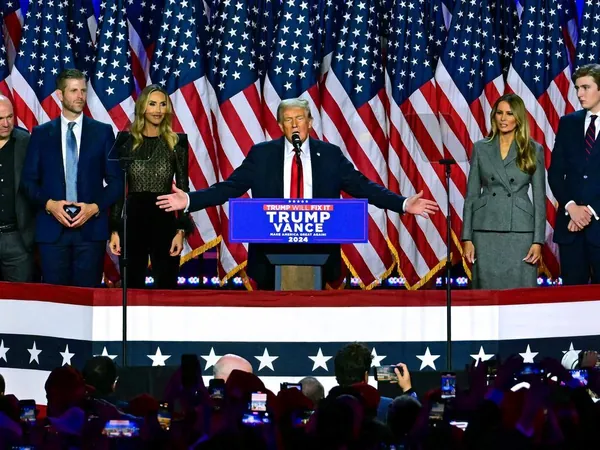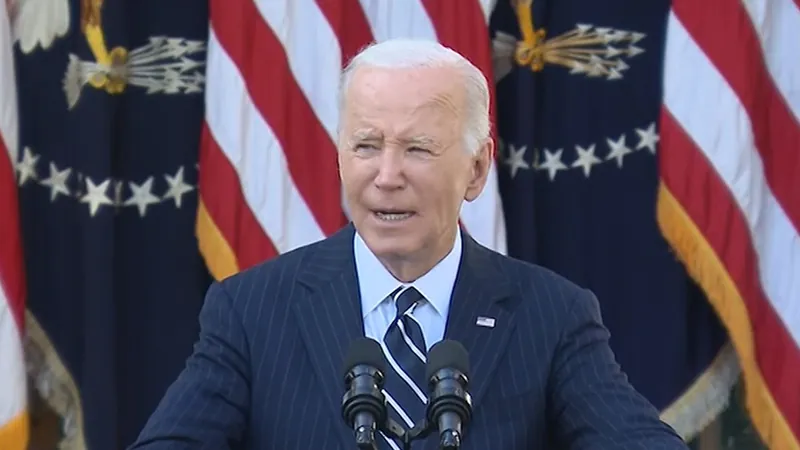
Trump’s Economic Appeal Triumphs: How American Voters Opted for Change in 2024
2024-11-06
Author: Emily
Trump’s Economic Appeal Triumphs: How American Voters Opted for Change in 2024
In a surprising turn of events, America has once again placed its trust in Donald Trump as the nation’s leader, signaling a resounding call for change in economic policy. As the 2024 election results rolled in, one crucial factor stood out: American voters feel they're worse off today than they were four years ago, and they believe Trump is the one who can turn the tide.
In a nod to a strategy used by Ronald Reagan during the 1980 presidential campaign, the question 'Are you better off than you were four years ago?' reverberated throughout the election forums, highlighting economic discontent as the pivotal issue. As voters grappled with soaring food prices, escalating housing costs, and a widespread feeling of being economically sidelined, Trump’s campaign resonated deeply with those sentiments.
The 2024 election was fraught with moments that seemed unthinkable just a few years ago. Many pundits struggled to understand Trump’s appeal, but the adage from Bill Clinton’s strategist, James Carville, rings more true than ever: 'It's the economy, stupid.' The landscape of American politics has shifted, and the reservoir of dissatisfaction with the current administration has propelled Trump back into the Oval Office.
Beyond the voter sentiment, Trump's campaign successfully incorporated non-traditional alliances like Robert F. Kennedy Jr. and Tulsi Gabbard. By addressing health concerns and big pharmaceutical influences—topics less common in Republican discourse—they attracted diverse voters, including independents and women who were hesitant about Kamala Harris. This multifaceted approach proved to be a powerful strategy, effectively expanding Trump's support base beyond his traditional demographic.
While Democrats focused on issues like abortion rights and the narrative of Trump as a threat to democratic ideals, they failed to connect beyond their core audience. Voters across the nation are inundated with various reports from think tanks and global organizations touting economic success. However, those flat reports do not translate into the lived experiences of everyday Americans. They need tangible outcomes, not statistics from far-off entities like the OECD.
Take Anne, a resident of suburban Phoenix, as a representative example of the multitude of voters who placed their economic priorities above party ideologies. Within the last four years, Anne witnessed her community's home prices soar by 47%, with grocery bills similarly ballooning. Her decision to vote for Trump stemmed from a fundamental belief that he would better serve her family's economic needs, as opposed to the current leadership.
The voters in critical battleground states—Arizona, Georgia, Pennsylvania, Michigan, and Wisconsin—echoed Anne's sentiment. These are not extremists or supporters of misguided ideologies; they're ordinary citizens responding to the basic question of their economic wellbeing. As the election unfolded, it became evident that Trump had won back crucial regions that had tilted Democrat in the last election cycle.
Amidst the political chatter surrounding divisiveness and tone, a pivotal question remains: Did Trump benefit from a 'silent majority'—voters hesitant to disclose their enthusiasm for him? The election results seem to suggest that many were afraid of associating with an accused label merely for casting their votes for economic revival.
As the dust settles, the analysis will delve deep into the strategies each campaign employed, but one undeniable fact emerges: Trump's comeback is perhaps the most remarkable political resurrection in American history. With a national popular vote reaching around 51%, surpassing many predictions, the voters seemed united in the desire for a thriving economy.
As we navigate the aftermath of this election, it’s crucial to contemplate the messages delivered by voters across the nation. Will the new administration be able to meet the expectations of the people who once again placed their hopes in Trump? The next few months may reveal just that, setting the stage for another intense chapter in American politics.









 Brasil (PT)
Brasil (PT)
 Canada (EN)
Canada (EN)
 Chile (ES)
Chile (ES)
 España (ES)
España (ES)
 France (FR)
France (FR)
 Hong Kong (EN)
Hong Kong (EN)
 Italia (IT)
Italia (IT)
 日本 (JA)
日本 (JA)
 Magyarország (HU)
Magyarország (HU)
 Norge (NO)
Norge (NO)
 Polska (PL)
Polska (PL)
 Schweiz (DE)
Schweiz (DE)
 Singapore (EN)
Singapore (EN)
 Sverige (SV)
Sverige (SV)
 Suomi (FI)
Suomi (FI)
 Türkiye (TR)
Türkiye (TR)